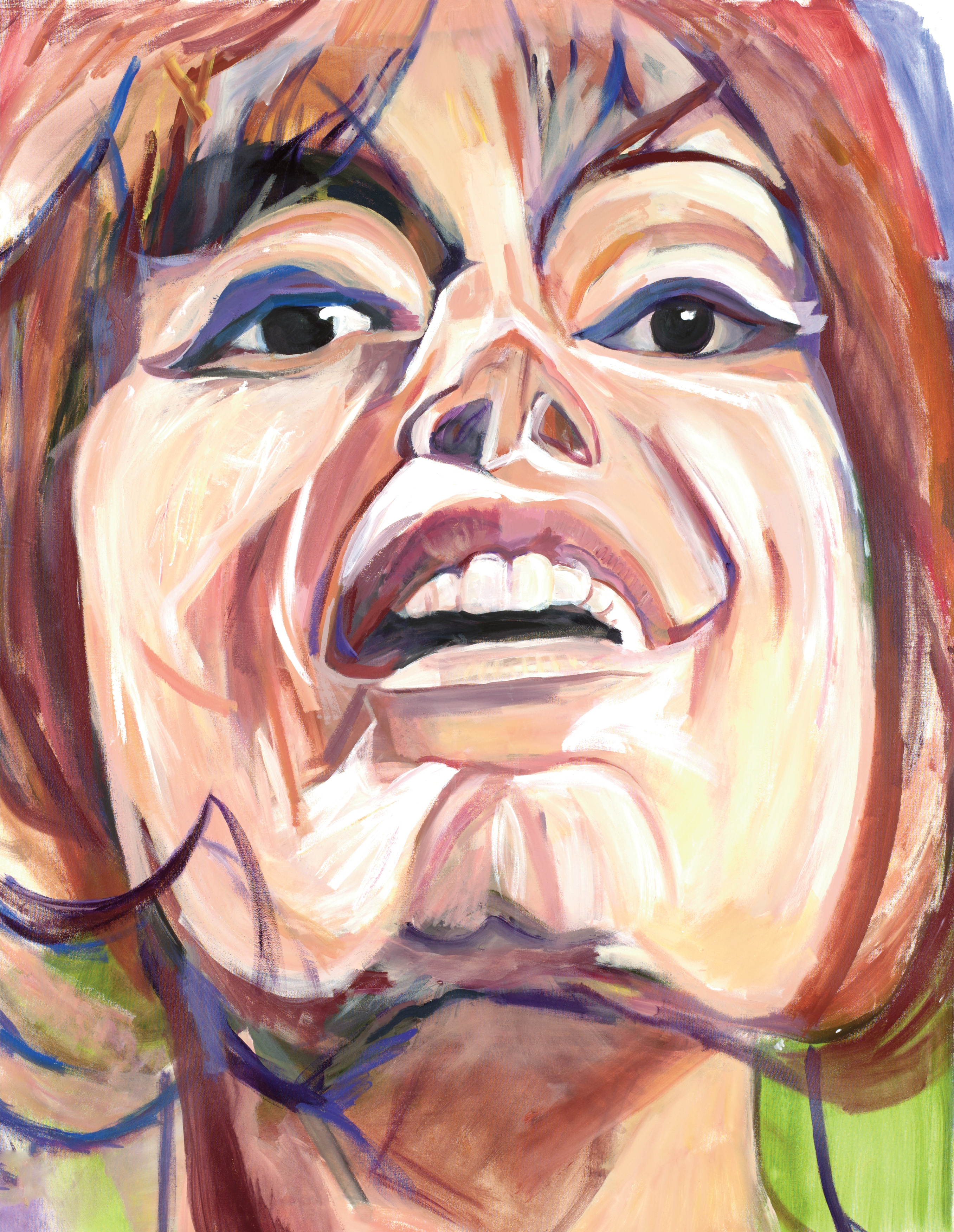
Pauline Julien, CQ, singer, actress, songwriter (born 23 May 1928 in Trois-Rivières, QC; died 1 October 1998 in Montréal, QC). Nicknamed “the passionara of Québec,” the singer Pauline Julien was known for her expressive power and sensitivity — qualities she drew from her experience in both music and theatre. Julien was equally popular in Québec and Europe, and also enjoyed success in English Canada. She introduced the songs of Weill and Brecht to Québec, popularized songs by Raymond Lévesque and Gilles Vigneault, and released 23 solo albums in her lifetime. She received two Grand prix du disque from Paris’ Académie Charles-Cros and the Prix de musique Calixa-Lavallée from Montréal’s Société St-Jean-Baptiste. She was made a knight of the Ordre des arts et des lettres de France and of the National Order of Québec.
Early Years and Career
From 1947 to 1951, Julien acted in Québec City with the Comédiens de la Nef and in Montréal with the Compagnie du Masque. In 1950, she married actor Jacques Galipeau; and in 1951 she went to Paris, where she studied dramatic arts. Her daughter, Pascale, was born that year, and her son, Nicolas, in 1955. In 1954, she began singing in Paris theatre productions and — with a repertoire of songs by Kurt Weill, Bertolt Brecht, Léo Ferré and Boris Vian — in left-bank Parisien boîtes, and on French radio and television. From 1957, when she separated from Galipeau, to 1961, her career was divided between Montréal, where she made her debut at the Cabaret Au Saint-Germain-des-Prés, and Paris.
Recording and Touring
Julien’s first two albums, Enfin ... Pauline Julien (1962) and Pauline Julien (1963), along with her performances with Claude Gauthier and Claude Léveillée, and several TV appearances in 1963, established her as a popular and affecting chanteuse. In 1964, she was the CBC's representative at the International Song Festival in Sopot, Poland. Her performance of Gilles Vigneault's “Jack Monoloy” won second prize, and she then embarked on a tour of the country.
She appeared regularly at Québec's most prominent venues (e.g., the Comédie-Canadienne, Place des Arts, Le Patriote, Québec City's Grand Théâtre) and in Europe's major cities, especially Paris, at such venues as the Théâtre de l'Est parisien, the Bobino, the Olympia, the Théâtre de la Ville and the Théâtre de la Renaissance.
In the late 1960s and early 1970s, Julien's repertoire consisted exclusively of songs by Québec writers. In 1968, she began to write song lyrics. Over the next decade she sang music by François Dompierre, Claude Dubois, Stephane Venne, Pierre Flynn, Gerry Boulet, Gaston Brisson, François Cousineau and Jacques Marchand; each of the last three served at one time or another as her music director. She also composed songs to lyrics by Michel Tremblay.
During this period, Julien performed at the Mariposa Folk Festival (1971), on tour in Ontario (1972), at Camp Fortune near Ottawa (1973) and at the National Arts Centre (1971, 1972 and 1974). She performed in Toronto in 1964 and 1968, toured the USSR in 1967 and 1975, and represented Québec at the Primera Festival de la Cancion Popular in Cuba.
Also in the mid-1970s, Julien restored Weill-Brecht songs to her repertoire. She performed in Edmonton, Calgary and Vancouver in 1976, at the Guelph Spring Festival in 1977 and at the Festival of Nations at Glendon College in Toronto in 1978. From 1977 to 1978 she toured Québec and Europe to great acclaim in support of her album Femmes de paroles (1977). She toured Western Canada in 1981.
In the early 1980s, Julien toured annually in France and Québec. Her album Charade (1982) included two of her bigest hits: “L'Âme à la tendresse” and “Mommy.” For her album Où peut-on vous toucher? (1985), she toured in Algeria, France, Belgium, Switzerland, Luxembourg, Italy and Québec. Also in 1985, she spent two and a half months in Nepal, which she described in her book L'Échappé belle, Népal. In 1986, she announced her retirement from solo performing, but she continued to pursue interesting collaborative performances, such as those with her second husband, poet Gérald Godin. In 1990, with the actress Hélène Loiselle, she gave a recital of Québécois poetry, “Voix parallèles,” at the Café de la Place des Arts in Montréal and at the Petit Champlain in Québec City.
Theatre
From 1961 to 1962, Julien played Jenny in Weill and Brecht's L'Opéra de Quat'sous at Montréal's Théâtre du Nouveau Monde. In 1978, for Fernand Nault's ballet to Weill's Les Sept Péchés capitaux (The Seven Deadly Sins), she sang the role of Anna (danced by Sylvie Kinal-Chevalier), both for the premiere that year at the National Arts Centre and for an LP (Kébec-Disc KD-977).
During the 1980s and early 1990s, Julien performed mainly in the theatre, namely in Brecht-Weill's Grandeur et décadence de la ville de Mahogonny (1984), Heiner Müller's Rivages à l'abandon (1990), Victor Lévy Beaulieu's La Maison cassée (1991) and Les Muses au musée at the Musée d'art contemporain de Montréal (1992).
Film
Julien also appeared as an actress in several Québec films, including Jean-Paul Bernier’s feature La Terre à boire (1964), Jacques Godbout’s short film Fabienne sans son Jules (1964), The Trial of the Swordfish (1969), Bulldozer (1971), featuring the music of Offenbach, Pleure donc pas Germaine (1972) and Gilles Carle’s La Mort d'un bûcheron (1973).
Television
Julien was the host of CBC TV's Mon Pays, mes chansons (1965–66). In 1975, she performed in Toronto for the CBC TV program, Three Women with Maureen Forrester and Sylvia Tyson.
Political Involvement
A passionate political activist, Julien was committed to political independence for Québec. She declined an invitation to sing before Queen Elizabeth II in Charlottetown in 1964 and was jailed for protesting the War Measures Act during the October Crisis of 1970. She also took up the feminist cause in the mid-1970s. She introduced the song “La Moitié du monde est une femme” (written with Marchand) in 1975.
She and her second husband, poet Gérald Godin, a Parti québécois culture minister who was her partner from 1961 and whom she married in 1990, were the subject of a National Film Board film Québec, un peu, beaucoup, passionnément, which was televised on CBC and on the PBS network in the US.
Julien appeared at various political rallies and also performed humanitarian work. She travelled to Burkina Faso with the aid organization Canadian Centre for International Studies and Cooperation in 1993. Châtelaine published some of Julien's letters home from Africa in its July 1993 issue. She subsequently travelled to Rwanda in 1994.
Tributes and Legacy
Writing in La Patrie in 1964, Jean Gascon observed, “Pauline Julien is a curious mixture of strength and fragility, assurance and insecurity, youth and maturity, knowledge and instinct, waif and woman. This bipolarity makes her at once elusive and extremely engaging. If I had to describe her talent with just one adjective, it would be the word entrancing that I would use.”
Montréal Centre des arts de la scène Pauline-Julien and Montréal’s Salle Pauline Julien, both devoted to francophone arts, are named in her honour, as is Montréal’s Centre Pauline-Julien for adult education.
In her final years Julien suffered from degenerative aphasia, a debilitating brain disease that affected her speech and imposed a partial paralysis. She took her own life in 1998 at the age of 70. Her papers are held at the Bibliothèque et Archives nationales du Québec.
Awards
Grand prix du disque (Suite québécoise), l'Académie Charles-Cros (1970)
Prix de musique Calixa-Lavallée, Société St-Jean-Baptiste (1974)
Grand prix du disque (Où peut-on vous toucher?), l'Académie Charles-Cros (1985)
Knight, l’Ordre des arts et des lettres, Government of France (1994)
Knight, National Order of Québec (1997)
Discography
Enfin ... Pauline Julien (1962). Col FL-290.
Pauline Julien (1963). Col FL-296.
Pauline Julien à la Comédie-Canadienne (1964). Col FL-317.
Solidad et Barbarie [pour enfants]. (ca. 1964). HFL-8002.
Pauline Julien chante Raymond Lévesque (1965). Gamma GS-103.
Pauline Julien chante Boris Vian (1966). Gamma GS-107.
Suite québécoise (1970). Gamma GS-112.
Comme je crie, comme je chante ... (1970). Gamma GS-125.
Album souvenir Pauline Julien (1971). LT-809.
Fragile (1971). Zodiaque ZO-6900.
Les Grands Succès de Pauline Julien (1971). 2 vols. Gamma G2-1001/G2-1014.
Au milieu de ma vie, peut-être à la veille de ...(1972). Zodiaque ZOX-6002.
Allez voir, vous avez des ailes (1973). Zodiaque ZOX-6007.
Pour mon plaisir ... Gilles Vigneault (1973). Zodiaque ZOX-6014.
Licence complète (1974). Zodiaque ZOX-6018.
Pauline Julien en scène (1975). Deram XDEF-124.
Tout ou rien (Récital Brecht Enregistré En Public)(1976). Telson AE-1502.
Femmes de paroles (1977). Kébec-Disc KD-935.
Mes Amies d'filles (1978). Kébec-Disc KD-949.
Les Sept Péchés capitaux (1979). Kébec-Disc KD 977.
Fleurs de peau (1980). Kébec-Disc KD-995.
Je vous entend chanter (1980). Kébec-Disc KD-507-509.
Charade (1982). Kébec-Disc KD-535.
Où peut-on vous toucher?(1985). Auvidis AV-4464.
See also: Discography for Chansonniers.
Writings
Pauline Julien and Denise Hébert, L'Échappé belle, Népal (Montréal, 1985).
Pauline Julien, Il fut un temps où l'on se voyait beaucoup (Outremont, 1998).
A version of this entry originally appeared in the Encyclopedia of Music in Canada.

 Share on Facebook
Share on Facebook Share on X
Share on X Share by Email
Share by Email Share on Google Classroom
Share on Google Classroom
